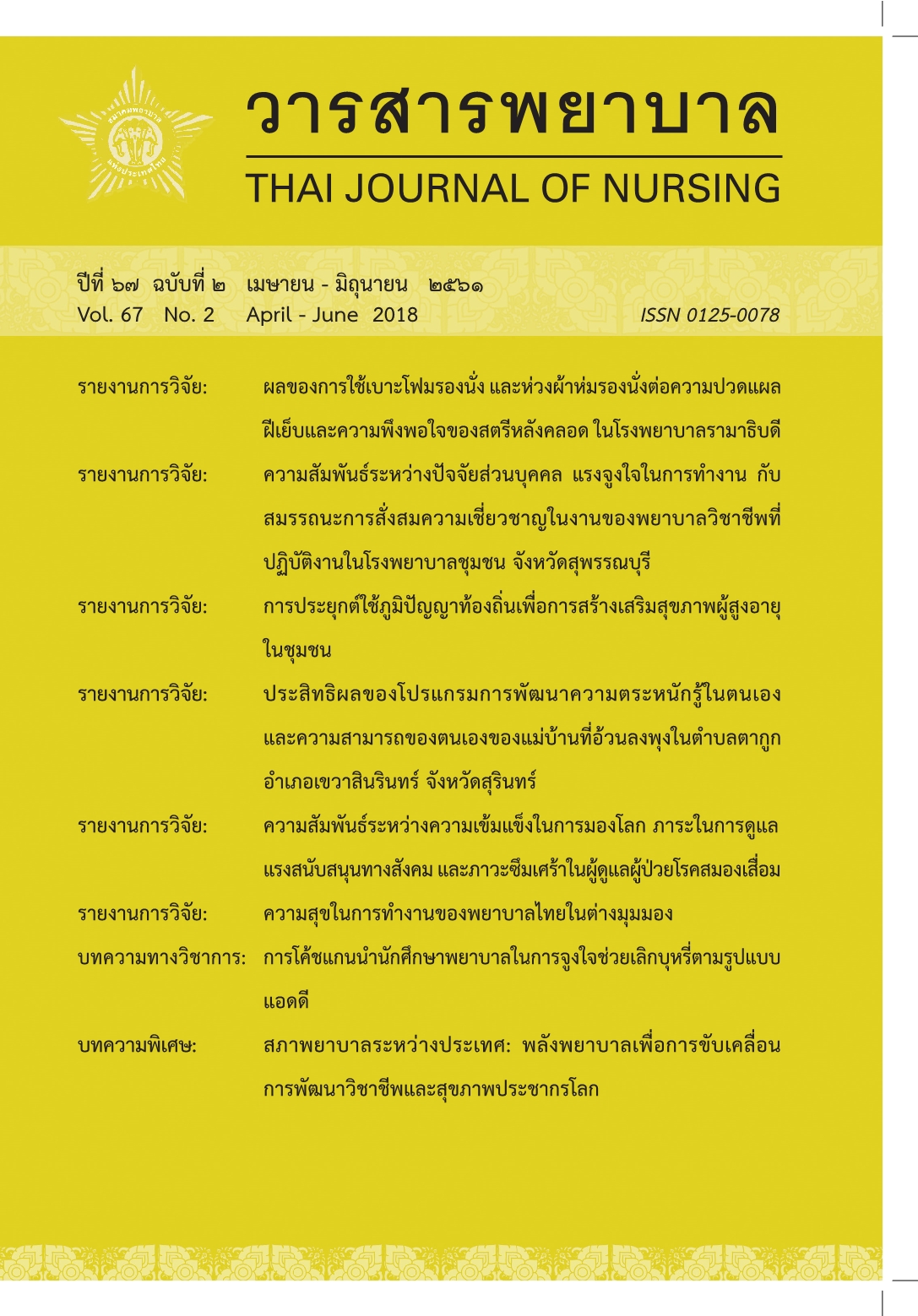The effectiveness of a program for self-awareness and self-efficacy development in abdominal obesity housewives at Ta Kuk Subdistrict, Khwao Sinrin District, Surin Province
Main Article Content
Abstract
The purposes of the quasi-experimental research were to study the effects of a program for self-awareness and self-efficacy development on self-awareness, self-efficacy, food consumption behaviors, exercise behaviors, outcome expectation, waist circumference and body mass index of abdominal obesity housewives at Ta Kuk subdistrict, Khwao Sinrin district, Surin province. The sample included 68 housewives aged 35-59 years who had body mass index and waist circumference over standard. The housewives were selected by the simple random sampling technique and put into the experimental and comparative groups which each group comprised 34. Research tools include: 1) the program for self-awareness and self-efficacy development which developed based on the self-awareness theory of Duval and Wicklund (1982) and the self-efficacy theory of Bandura (1988). The duration of the program was 10 weeks. The activities comprised: (1) lecture, video watching, skills training, workbook doing, (2) telling successful experiences, (3) health model, (4) verbal persuasions by buddy, and (5) emotional arousal. 2) Questionnaires comprised seven sections: general information, self-awareness, self-efficacy, food consumption behaviors, exercise behaviors, outcome expectation and physical examination. Content validity indexes (CVI) were 0.84-0.95, and Cronbach’s alpha coefficients were 0.80-0.93. 3) Housewife manual and 4) waist tape and digital weight scales. Data were analyzed by descriptive statistics and t- test. The results revealed as follows. After attending the program, self-awareness, self-efficacy, food consumption behaviors, exercise behaviors, outcome expectation of the experimental group were significantly better than before attending the program, as well as, these results were better than the control group (p< .05). Also, waist circumference and body mass index of the experimental group were significantly less than before attending the program, but there was no difference between the experimental group and the control group (p > .05).
Article Details
References
โรงพิมพ์องค์การสงเคราะห์ทหารผ่านศึก.
ถาวร มาต้น, และปัทมา สุพรรณกุล. (2555). ผลของโครงการคนไทยไร้พุงต่อการลดค่าดัชนีมวลกายและเส้น
รอบเอวของประชาชนที่เข้าร่วมโครงการในโรงพยาบาลส่งเสริมสุขภาพตำบล เขตจังหวัดภาคเหนือ
ตอนล่าง. วารสารสาธารณสุขศาสตร์, 42(3), 83-94.
พรพิมล เวชกุลธำรง. (2547). ผลของโปรแกรมส่งเสริมสุขภาพต่อพฤติกรรมการออกกำลังกายและภาวะ
สุขภาพของสตรีวัยกลางคนที่มีน้ำหนักเกิน จังหวัดฉะเชิงเทรา. วิทยานิพนธ์พยาบาลศาสตร
มหาบัณฑิต, มหาวิทยาลัยบูรพา.
ยุภาพร นาคกลิ้ง, ทัศนีย์ รวิวรกุล, พิมพ์สุรางค์ เตชะบุญเสริมศักดิ์, และวราภรณ์ เสถียรนพเก้า. (2554).
ผลของการประยุกต์ทฤษฎีความสามารถตนเองต่อพฤติกรรมการควบคุมอาหาร การออกกําลังกาย
และระดับความดันโลหิตของผู้สูงอายุโรคความดันโลหิตสูง. ค้นเมื่อวันที่ 10 กรกฎาคม 2559,
จาก https://www.tci-thaijo.org/index.php/bcnbangkok/article/view/4844/4185
โรงพยาบาลมหาราชนครราชสีมา. (2556). โรคฮิต คนไทย "อ้วนไว้พุง". ค้นเมื่อวันที่ 20 กุมภาพันธ์ 2559,
จาก http://www.mnrh.go.th/th/info.php?act=journal&id=57
สายสมร พลดงนอก, สรวิเชษฐ์ รัตนชัยวงศ์, จันจิราภรณ์ วิชัย, และธัญญลักณ์ ทอนราช. (2558). ความรู้เรื่อง
โรคอ้วนลงพุง (Metabolic Syndrome). ขอนแก่น: หน่วยสร้างเสริมสุขภาพงานเวชกรรมสังคม
โรงพยาบาลศรีนครินทร์.
สำนักงานกองทุนสนับสนุนการสร้างเสริมสุขภาพ. (2555). คนไทยกว่า 17 ล้าน น้ำหนักตัวเกิน-อ้วน.
ค้นเมื่อวันที่ 20 กุมภาพันธ์ 2559, จาก http://www.thaihealth.or.th/Content/3797
Bandura, A. (1988). Perceived self-efficacy: Exercise of control through self-belief. In J. Dauwalder,
M. Perrez, & V. Hobi. (Eds.). Annual series of European research in behavior therapy (Vol. 2,
\ pp. 27-59). Lisse, NL: Swets & Zeitlinger.
Duval, T. S., & Wicklund, R. A. (1972). A theory of objective self awareness. Oxford, England:
Academic Press.
World Health Organization. (2000). Obesity: Preventing and managing the global epidemic ( WHO
Tech. Rep. No. 894). Geneva, Switzerland: Author.


